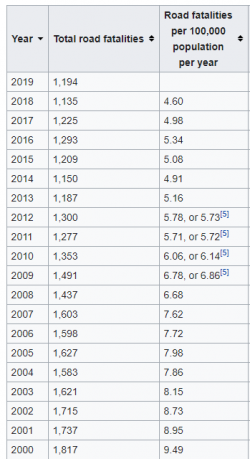Too much 'smirk & mirrors' in the Oxford report (prefer an independent one but call me cynical given the tens of $$ billions involved, yes they are only covering their 'costs' [it is all in the definition of costs]).
Even the CMO has broken down the risk by age group.
The weighted avg risk of CV death over the entire population is made up by the over 75s contributing around 90% of that figure. And that was for the battery hen like nature of being kept in their nursing homes with unprepared staff lacking (for the most part) sufficent PPE +/or training, or holding a staff party in disregard for the rules.
The risk of death for someone under 75 is a fraction of that of those over 75. It is even lower for those under 65, etc etc.
When 'whole of population' annual figures are used against figures for 3 weeks worth of vaccinations - credibility is severely lacking and it reeks more of 'marketing' not rigour.
Too often the attitude of doctors & nurses servicing Aged Care facilities is, 'They're old, this is normal,' even when it is not & the doctor forgot he was supposed to be having fortnightly blood tests done due to the toxicity of one drug prescribed.
Case in point why is Risperidone/Risperdal one of the most frequently prescribed drug when its major risks include increasing blood pressure, increasing incidence of strokes etc etc? The subject of criminal prosecution overseas yet still approved & used widely in Australia.
4 Nov 2013 — The resolution includes criminal fines and forfeiture for violations of the ... introduced the antipsychotic drug Risperdal into interstate commerce
When I challenged one particular Doctor (complete with the printout of the safety notice) his response was 'Everybody prescribes it.' Which is unfortunately true. Just how many of the daily deaths are solely due to the continued use of Risperdal (also known as happy pills by staff as it makes the staff happy & the resident like a mound of jelly) = quiet nights for staff as nobody calling out for assistance.
So, as we keep being told there are 50 deaths a day (typically) in Aged Care facilities, I wonder how much effort has been going into determining if vaccine related? Too date the failure of the two private sector companies delegated to by the Federal Govt (due to have finished 3 weeks ago but only around 40% of residents and <10% of staff received 1st dose) could well be a better outcome.
Even the CMO has broken down the risk by age group.
The weighted avg risk of CV death over the entire population is made up by the over 75s contributing around 90% of that figure. And that was for the battery hen like nature of being kept in their nursing homes with unprepared staff lacking (for the most part) sufficent PPE +/or training, or holding a staff party in disregard for the rules.
The risk of death for someone under 75 is a fraction of that of those over 75. It is even lower for those under 65, etc etc.
When 'whole of population' annual figures are used against figures for 3 weeks worth of vaccinations - credibility is severely lacking and it reeks more of 'marketing' not rigour.
Too often the attitude of doctors & nurses servicing Aged Care facilities is, 'They're old, this is normal,' even when it is not & the doctor forgot he was supposed to be having fortnightly blood tests done due to the toxicity of one drug prescribed.
Case in point why is Risperidone/Risperdal one of the most frequently prescribed drug when its major risks include increasing blood pressure, increasing incidence of strokes etc etc? The subject of criminal prosecution overseas yet still approved & used widely in Australia.
Johnson & Johnson to Pay More Than $2.2 Billion to Resolve ...
https://www.justice.gov › ... › News4 Nov 2013 — The resolution includes criminal fines and forfeiture for violations of the ... introduced the antipsychotic drug Risperdal into interstate commerce
When I challenged one particular Doctor (complete with the printout of the safety notice) his response was 'Everybody prescribes it.' Which is unfortunately true. Just how many of the daily deaths are solely due to the continued use of Risperdal (also known as happy pills by staff as it makes the staff happy & the resident like a mound of jelly) = quiet nights for staff as nobody calling out for assistance.
So, as we keep being told there are 50 deaths a day (typically) in Aged Care facilities, I wonder how much effort has been going into determining if vaccine related? Too date the failure of the two private sector companies delegated to by the Federal Govt (due to have finished 3 weeks ago but only around 40% of residents and <10% of staff received 1st dose) could well be a better outcome.

















